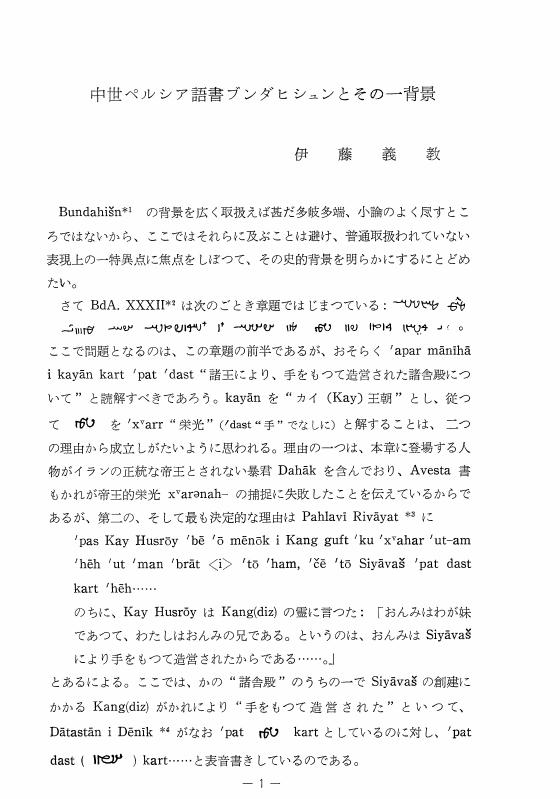2 0 0 0 OA 『先師金言要集』とアンダルズ文献研究序説 (下)
- 著者
- 伊藤 義教
- 出版者
- 一般社団法人 日本オリエント学会
- 雑誌
- オリエント (ISSN:00305219)
- 巻号頁・発行日
- vol.7, no.2, pp.15-31,104, 1964-10-30 (Released:2010-03-12)
This article is composed of three parts. In the 1st part, the writer has given a new translation of Citak Handarz i Poryotkesan. A new translation may be justified for ex. in §33 (cf. p. 15, n. 36), §54 (cf. p. 16, n. 47) and the beginning of §32: be pat han i χves hukunisnih “if not through his own good deeds” which should be taken as the last constituent of §31. In the 2nd part, the writer points out a morphologic relation between the early Achaemenian inscriptions and documents on the one hand, and the Andarz-literature on the other: in other words, Dar. Naqs-i-Rostam inscriptions as well as Xenophon's Cyropaedeia VIII 7, 1-28 are nothing but a sort of combination of historiography and andarz. It is interesting to note that parallelisms can be found between Dar. NRa 11. 56-58: martiya hya Auramazdaha framana hauv-taiy gasta ma θadaya and Citak Handarz i Poryotkesan §20: apak hamak vehan pat dat-χup-sandakih estatan “With all the good people one must stand in the situation that the Law seems (sandakih<sand-“videri”) agreeable (to himself)”. The 3rd and last part is a short survey of the Andarz-literature, leaving behind the problem of what development in thought and spirit this genre of literature has ever made.
2 0 0 0 OA 『先師金言要集』とアンダルズ文献研究序説 (上)
- 著者
- 伊藤 義教
- 出版者
- 一般社団法人 日本オリエント学会
- 雑誌
- オリエント (ISSN:00305219)
- 巻号頁・発行日
- vol.7, no.1, pp.1-17, 1964-08-15 (Released:2010-03-12)
1 0 0 0 OA 中世ペルシア語書ブンダヒシュンとその一背景
- 著者
- 伊藤 義教
- 出版者
- 一般社団法人 日本オリエント学会
- 雑誌
- 日本オリエント学会月報 (ISSN:18841384)
- 巻号頁・発行日
- vol.3, no.1-2, pp.1-16, 1960-02-29 (Released:2010-03-12)
1 0 0 0 ガーサー語彙の研究
- 著者
- 伊藤 義教
- 出版者
- The Society for Near Eastern Studies in Japan
- 雑誌
- オリエント (ISSN:00305219)
- 巻号頁・発行日
- vol.9, no.1, pp.1-21,89, 1966
In Gathica 1. <i>xšmavato</i>, the present writer has come to the conclusion that <i>xšmavato</i> should be taken as nom., voc. or acc. P1. of <i>xšmavat</i>- "Your Highness", and not as abl. -gen. sg. of <i>xšmavat</i>- "resembling you, your-like, your adherent" (adj.) as is generally accepted. See my paradigm (p. 5.) of all the pronominal stems suffixed with -<i>vant</i>-. —In Gathica 2. <i>aka</i>, rejecting all of the interpretations proposed thus far, the present writer has pointed out the fact that the Gathic <i>aka</i> has retained its primordial meaning "to show, make clear", so that it may be regarded as an infinitive (abl. -gen. sg. of <i>aka</i>-) "in order to show, for showing". It is only in yAv. that what is meant by <i>aka</i> came near to what is meant by Pahl. <i>akas</i> "clear, evident". —In Gathica 3. <i>manaroiš</i>, the writer has derived <i>manari</i>-from <i>mru</i>-/<i>mrav</i>- (Skt. <i>bru</i>-) "to speak" (<i>mru</i>->[after the pattern of <sup>3</sup><i>dar</i>-><i>dadari</i>-] <i>mamravi</i>->[with the metathesis of <i>ra</i>><i>ar</i> prior to <i>aui</i>><i>aoi</i>] <i>mamarvi</i>->[with the assimilation of <i>v</i> to <i>i</i> in <i>vi</i>><i>yi</i>]<i>mamaryi</i>-><i>mamari</i>->[with the dissimilation of <i>m</i>><i>n</i>]<i>manari</i>-). The hapax <i>manaroiš</i> (Y. 48<sub>10</sub> a) would then mean "away <i>or</i> separating from crying".<br>The translation of several passages should suffice as examples showing my interpretation.<br>Y. 44<sub>1</sub>, <i>bc</i>: "By-virtue-of-(my)veneration—such-as the veneration (in general should be)—, o Your-Highness (<i>xšmavato</i>), o Mazda-, may Thy-Highness (θ<i>wavas</i>) tell to (Thy) friend, i. e. to myhumble-self (<i>mavaite</i>)!"<br>Y. 51<sub>13</sub> <i>bc</i>: "(the <i>dregvant</i>) whose soul shall become angry at (him) at the Cinvat Bridge, in order to show (<i>aka</i>) (thus): 'With the deed of (thy) own as well as of (thy) tongue thouhast-gone-astray from the way of justice'."<br>Y. 50<sub>2</sub> <i>cd</i>: "Those-living-rightly with justice among the many keeping off the sun —in order to show them (<i>akasteng</i> i. e. <i>akas teng</i>) mayest Thou make me arrive at the gifts of givers!"<br>Y. 48<sub>10</sub> <i>a</i>: "When, o Mazda, shall the warriors attend-the-sacrifice, separating-from-(their) crying (<i>manaroiš</i>)?" that is, "The warriors are now adhering to the old cult in which cry is raised to kill the ox. When shall they separate from such a religious custom in order to attend our newly established cult?"



